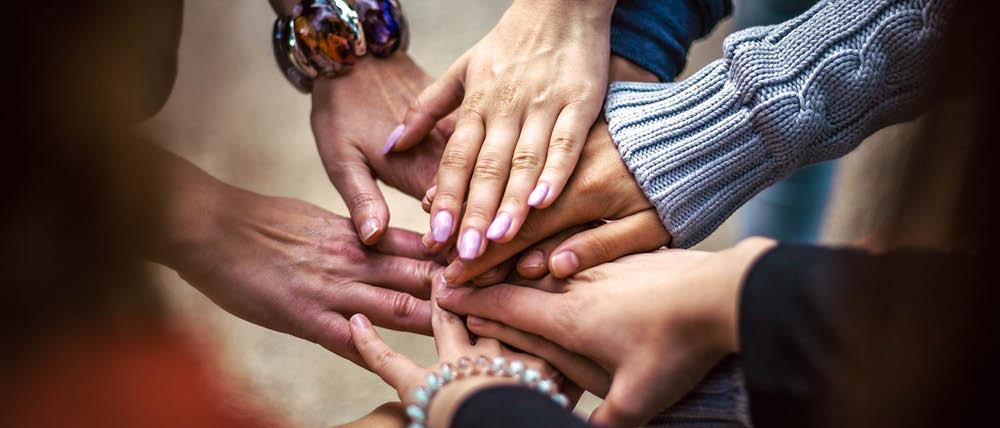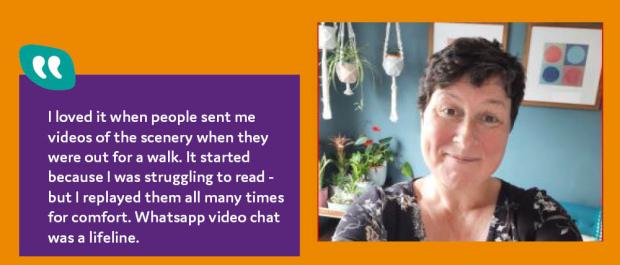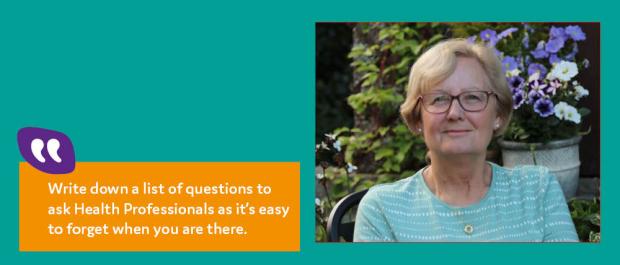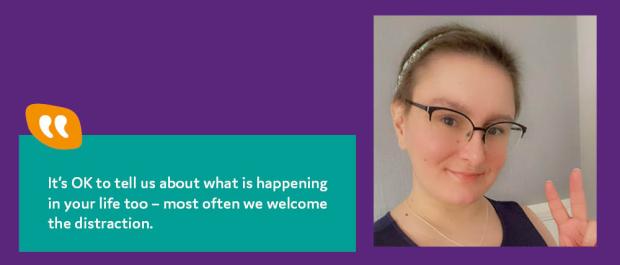Top tips for family, friends and carers
We know that a diagnosis of lymphoma has an impact on family, friends and carers, as well as the individual themselves. We asked our family, friend and carer members of our Facebook group and online support meetings for their 'top tips' for self-care, and what they would say to other people in their position. We also asked what helps them to support their person with lymphoma, and asked people with lymphoma what they would say to other families, friends and carers. Here is what they told us.

Top tips for looking after yourself
The following suggestions might be ways in which you can practice some self-care and look after yourself.
- Consider setting up a social media group (such as a WhatsApp group). This can mean that you can keep everyone informed about progress (and saves copying and pasting the same message to lots of people). It's also useful if you need to ask for help with anything.
- Ask friends and family to record video messages (rather than texting or calling) even just a wave to say hello. Seeing familiar face makes a huge difference when you are isolated or worried - that goes for you and for the person with lymphoma.
- If you can, keep up with your own hobbies and interests, and make some time for yourself. It's important not to forget you, and looking after yourself. (Remember that 'you can't pour from an empty vessel' - so you need your wellbeing and health to be 'topped up' in order to support others.)
- Scented candles and massage balms can be a nice way to get rid of any 'chemo' smells, and also make a nice distraction, especially bedtime.
- If your friends offer to help - take them up on it. Sometimes it is useful to ask for specific things, such as help with transport, making some meals to keep in the freezer, or running errands for you.
- Keeping your home tidy can sometimes feel overwhelming, but it can help to keep a sense of normality at home, give you a focus, and help the person with lymphoma feel settled in their normal environment. And if anyone offers to help with housework or gardening take them up on the offer.
- If you are worried or concerned, never be afraid to reach out and ask for help.

Top tips for helping with the practical side of lymphoma
The following suggestions might be ways in which you can be involved and support the person with lymphoma.
- Make a note of each prescribed medication by its long name (generic name) as well as its brand name, as its difficult to remember which is which.
- Using a pill dosette box or dispense can help to keep medication organised.
- Use a ‘chemo’ diary to note appointments and what happened at the appointments, as well as any side effects – this helps to build a picture of the chemo ‘journey’. Also remember to note down any good things, such as feeling OK, or being able to go out and about.
- Write down the responses to the questions (see above).
- Create a simple spreadsheet or chart for any medications to be taken at home to help you keep track.
- For the person with lymphoma, their food taste and appetite can increase, decrease or be changeable over time. Buying food and preparing it in advance might help. It is important to look after yourself too, and make sure you are eating as usual.
- Having a reliable thermometer at home, as well as any agreed over-the-counter painkillers, mouth washes, muscle rubs etc can be helpful.
- Never be afraid to call the nursing team whenever you need to - they are there to support you.
- And don’t ignore your gut ‘instinct’. If you feel something isn't right, call the nursing team.

What people with lymphoma want you to know
We asked people with lymphoma what they would say.
- Sometimes it can be hard to concentrate on reading or watching TV or films. Having videos of scenery with commentary are lovely as it can be a struggle to read.
- We know you can't make it right, sometimes we just need a hand to hold.
- Sometimes we can be irritable and short tempered, but we really appreciate your calmness and how much you care.
- We want to be able to support you too!
- Look after yourself and have your own space and support too.

This information comes from our Facebook users and online support meeting members, and is a list of suggestions from the community based on what they personally found useful and what they would like to pass on to others. This is not intended to be medical advice and is not a replacement for advice from your medical team. If you are looking for specific guidance for your own personal circumstances always consult your medical team.
